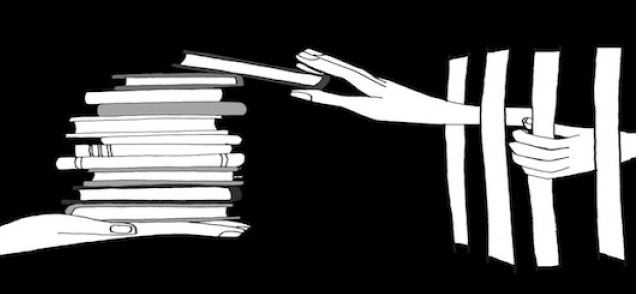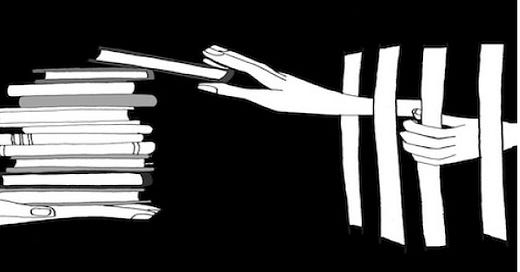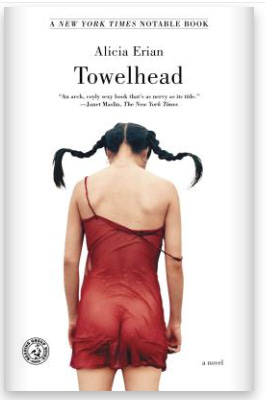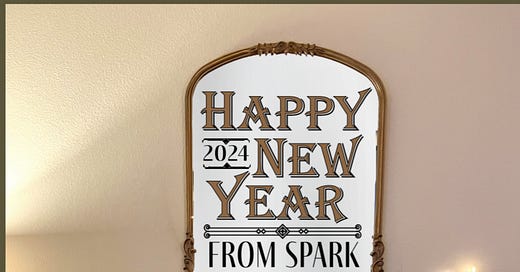
Welcome! You’ve reached Spark. Learn more here or just read on. If you received this from a friend, please join us by subscribing. It’s free! All you have to do is press the button below

Hello, Friends,
This week we deviate a little and just make the whole issue about one thing. That one thing? Writing and reading behind bars: the work of those who are incarcerated, were incarcerated and those who bring the written word to those who are locked up.
Before we start, let me ask a sensitive question: if you’ve ever been close to incarceration - as an inmate, a visitor, a family member, or a teacher - how did it impact your view of the world?
I’ve been fortunate. I’ve never been incarcerated but I have been close to some who have. I’ve also had the opportunity to work with young people who were “detained” in our county juvenile justice facilities which I share more about in a few paragraphs or so. One thing that stays with me is the feeling akin to “survivor’s guilt” that I felt every time I walked out and heard the doors lock behind me.
It feels important to remember that, in the end, a locked door may separate me from those I leave behind but there are ways to stay connected. Reading, writing, and sharing the written word is one way.
A Short Essay Goes Deep
I keep thinking about a very short essay that I stumbled across a while back when I ran down one of those Internet rabbit holes that lie in wait. It was written by Ivié DiMolina in the Bedford Hills Correctional Facility in New York where she is serving a life sentence. The subject: radical forgiveness.
Twenty-six years into her sentence, after two suicide attempts, DiMolina is asked to serve as a peer supporter in a suicide prevention program. Her first session brings her face-to-face with a woman who confesses she is a pedophile. DiMolina, who suffered years of sexual abuse at the hands of a family member, is thown back into the past and full-on into the hate and judgment she felt for her abuser and all those who did not help her. She writes:
“The entire time I let her talk, I felt ready to burst—until I saw tears form in her eyes.
“Please help me,” she said.
I saw myself. Those were the very same three words that I had been saying for two years. Please help me. I had gotten them from New York public advocate Jumaane D. Williams, whom I once heard say, “The most difficult words in our language are please help me. - Ivié DiMolina
To help, DiMolina must let go of her judgment and hatred not only for the woman and those who harmed the child that DiMolina had been but for herself. She does. The moment was a turning point for her. She writes about it and the rest of her life with intention and hope. It’s a redemption story but one that takes place within the walls of a prison where she will remain for decades, barring a successful appeal of a second sentence to start when she finishes this one.
Her story, though, made it out into the world and onto the pages of Harper’s as part of a partnership with Pen America. It wound up on the Internet and then on my computer screen where I read it several times and took a difficult and sometimes painful internal inventory of the ways I’ve judged and hated and imprisoned myself in dark corners. DiMolina’s story was straightforward and devoid of literary “grace notes” but it worked on my heart and soul and I am better for it.
Reading DiMolina’s story reminded me that words cannot be contained. Stories are escape artists. Poems elude any attempt to confine them. Yet “prison lit” is not a genre I’ve ever found on the shelves of a bookstore. Until I started looking, I didn’t realize how many places there were to find the work of incarcerated writers. Here are some of them - if you know of more, please let us know.
I’m Serving Life in Prison. Learning Not to Judge Others Has Set Me Free by Ivié DiMolina, in Harpers Bazaar. This is one of five essays produced in partnership with Pen America's Prison Writing Program. You can find all five here.
Pen America fosters and publishes writing by incarcerated people through its Pen America Prison and Justice Writing Project which includes The Pen America Prison Writing Awards. The winning selections are published in yearly anthologies. Find them here.
This list of Ten Books Written by Writers in Prison contained some surprises for me.
Piper Kerman (Orange is the New Black) and Chandra Bozelko (The Prison Diaries) are both white, Ivy League ex-cons who have become advocates for prison reform.
In 2013, Kimberly Bell wrote her play, The Broken Promise, while detained in San Diego County Juvenile Hall. Her script was selected by the Playwrights Project and was performed at the Lyceum Theater in San Diego. Read an interview with her here and check out the highlights below.
From Shakespeare to Towelhead: Reading Behind Bars
Words that flow from outside to inside the prison walls can be liberating too. For more than 15 years, I volunteered with an organization called the Juvenile Court Book Club, a group that meets in San Diego County’s juvenile detention facilities once a month and discusses books with the young men and women incarcerated there. I went to The Girls Rehabilitation Facility, where we discussed one book a month. In between the monthly book clubs, I tutored students in reading and English and they tutored me in the frustrations and resilience of young women who have been locked up.
Among the things I will always carry with me from this experience:
The tough girl who refused to read out loud until the two of us found ourselves in a corner one day with a battered copy of S.E. Hinton’s The Outsiders which I thought would be too dated for her. She read the first page, then the second. It became the first book she’d ever read from cover to cover on her own. “They are like people I know,” she said.
The day an impatient 14-year-old interrupted my attempts to help her two classmates wade through The Taming of The Shrew and in language that was part street part soap opera explained the whole thing in about a minute, then zoned out for the rest of the session.
Reading Pablo Neruda with a 16-year-old who spoke each word with love and reverence and fire and told me that she wrote poetry too
Witnessing a group of 15 girls lead a passionate and well-reasoned discussion about whether the 13-year-old protagonist of Towelhead was old enough to be held responsible for having sex with her adult neighbor.
The inspired and inspiring teachers I worked with there who developed classes around the books chosen each month. They expected effort and got it. They gave respect and received it in return. They understood the importance of books with stories and characters the girls could relate to as well as the ones that made them stretch.
Since its founding the JCCB has read around 300 books with youth detained in the county facilities. In addition books are donated regularly to the libraries for all the facilities. To find out more about the program and how to help, click here: JCCB.
And here are two more sites for organizations that, with your help, can get books into the hands of those who are incarcerated:
Poems from Prison
“It’s Friday Afternoon in the Florida State Penitentiary and The Men Read Poetry” by Laurie Rachkus Uttich who leads a writing workshop on Fridays at the Florida State Penitentiary. Here’s a excerpt to give you a taste. Unfortunately, the formatting of this poem is lost. Treat yourself to the whole thing as it was meant to be read HERE. And then check out this interview with poet Laurie Rachkus Uttich who also teaches at the University of Central Florida. She is the author of the forthcoming collection, Somewhere, a Woman Lowers the Hemline of Her Skirt. Click into the interview to read this sharp, funny, poignant poem from the collection: “In Their Infinite Wisdom, Decided That Sally Ride Would Want Makeup.”
Excerpt from “It’s Friday Afternoon in the Florida State Penitentiary and The Men Read Poetry”
RJ’s new and he doesn’t want to read anything, but can he just say something? He sold drugs.
He regrets it. He has accepted the Lord as his Almighty Savior. He regrets it, OK? OK. Thank you.
Marco tells him son, this here’s a poetry class and RJ says, well, shit, I thought it was that accountability
class we get credit for and we laugh and laugh and RJ says he likes what we’re doing over here
better than that chapel with all them white women, no offense, and their Bibles and gold
crosses and, Jesus, the men are even worse, the way they look at you like a bill
they gotta pay, but these are the only two damn places with air-conditioning
and we all agree it’s hotter than shit, and animals in a goddamn pound
are treated better and then I read Tim Seibles’s “First Kiss” and the men
place the words of his poem on their tongues like Communion
and we are all fifteen again, holy and hungry, standing under
a porch light while the earth splits beneath our feet and we
don’t move or speak because Tim’s words are still alive
in the space between us and beauty crumbles
when you try to catch it — we all know
that — so we let it settle on our skin
and hold our breath until Marco
says, like a prayer,
It be like that. It be just like that. - Laurie Rachkus Uttich
See also:
The Poetry of Prison: A Photographer Looks at the Lives of Oklahoma’s Incarcerated - an essay in photos and poems by men and women on the inside looking out or remembering the days they were inside.
Our Minds Are Still Free: These Former Prisoners Find Strength Through Poetry - a sampling from participants in the Free Minds Book Club and Writing Workshop
That’s all for this week. We’ll be back to regularly scheduled programming next week just in time for Mother’s Day. If you are looking for your next book or want to check out any of the books mentioned here, check out the Spark Community Recommendations Page at bookshop.org where sales support local bookstores. Any commission we earn will be donated to a literacy program selected by all of us.
Ciao for now,
Gratefully yours,
Betsy
P.S. And now, your moment of Zen…Let Them Eat Cake
These men are in prison but the cake they make is on its way to fine restaurants and tables everywhere. Read more below.
Prisoners icing colombe (photo by VICE)
While reading The Week in Italy l learned that thousands of Italians ate colomba over the Easter Holidays, a bread prepared by prisoners in a bakery that has become famous in Italy and abroad. I came across this Vice piece about the Giotto Bakery in Due Pallazzi Detention Center in Padua, Italy. The prisoners work under a renowned chef, sign fair contracts, and are paid well enough to send money to their families. The link with the “outside” is strengthened and the rate of recidivism has plunged. People who reportedly spit the bread out when they first learned that it was made by prisoners, are now seeking it out.
Calling for Your Contribution to “Moment of Zen”
What is YOUR moment of Zen? Send me your photos, a video, a drawing, a song, a poem, or anything with a visual that moved you, thrilled you, calmed you. Or just cracked you up. This feature is wide open for your own personal interpretation.
Come on, go through your photos, your memories or just keep your eyes and ears to the ground and then share. Send your photos/links, etc. to me by replying to this email or simply by sending to: elizabethmarro@substack.com. The main guidelines are probably already obvious: don’t hurt anyone -- don’t send anything that violates the privacy of someone you love or even someone you hate, don’t send anything divisive, or aimed at disparaging others. Our Zen moments are to help us connect, to bond, to learn, to wonder, to share -- to escape the world for a little bit and return refreshed.
I can’t wait to see what you send!














This is excellent.
In 1988 I was charged with Assault with Intent to Commit Murder. While not 100% innocent by the dictionary definition, I was certainly not guilty of intending to murder anyone or even causing physical injury. My boss at a small family owned restaurant cashed in an investment to bail me out pretrial after only a short period. I would have done a bare minimum of ten if convicted.
I have published a few short humorous looks at my experience (the humor abetted by the fact that the prosecutor in the case was named Luke Skywalker) and have used bits of knowledge I gained during the process in pieces of fiction.
Kudos for shining a light on these writers. I'm sharing the post now.
Beautiful!